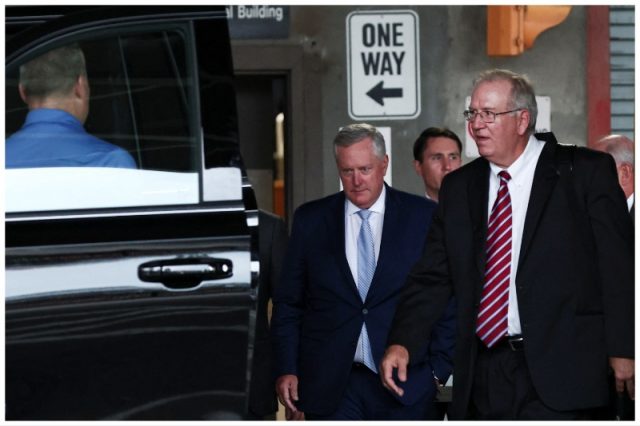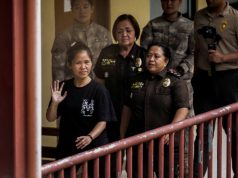
ATLANTA — Donald Trump’s onetime White House chief of staff Mark Meadows testified on Monday that he was doing his job when he helped Trump try to reverse his 2020 election loss, as the former aide sought to have his criminal case moved to potentially more favorable terrain in federal court.
Meadows argued that a state court in Democratic-heavy Fulton County was not the proper venue for a sweeping case that accuses Trump and other co-defendants of racketeering and other crimes.
Meadows is accused of arranging calls and meetings in which prosecutors say Trump pressured election officials to change the vote count in his favor.
Prosecutors argued that those acts were not “necessary and proper” duties for a U.S. president and his chief of staff, but Meadows said they were part of his portfolio as Trump’s top White House aide.
“There was a political component to everything we did,” Meadows testified in federal court in Atlanta.
Federal law prohibits states from prosecuting the activities of U.S. officials carrying out their duties.
The hearing is the first major court battle in the case in which prosecutors accuse Trump, the front-runner for the 2024 Republican presidential nomination, and 18 of his Republican allies of trying to overturn his election loss to Democrat Joe Biden.
Georgia Republican Secretary of State Brad Raffensperger, whom Trump asked during a phone call to “find” enough votes for him to win, was called to testify at the hearing by Fulton County District Attorney Fani Willis, an elected Democrat who brought the charges.
Raffensperger said in his testimony that Meadows facilitated the call, which occurred after the Secretary of State’s office had conclusively found there was no widespread fraud in Georgia. The federal government has no role in administering state elections, Raffensperger said.
Potential for precedent
U.S. District Judge Steve Jones said little during the hearing but appeared skeptical of Meadows’ argument, asking at one point if there was any part of the U.S. Constitution that outlined a role for the president in administering state elections.
Jones’ decision on the matter could have implications for Trump and his co-defendants, some of whom also have sought to move their cases to federal court.
Federal court also would draw from a larger and more politically diverse jury pool than in Fulton County, the Atlanta-area Democratic stronghold where Meadows and the other defendants were indicted.
Trump is a defendant in three other criminal cases, including a federal case in Washington that also accuses him of illegally trying to subvert the 2020 election.
His lawyer in that case, John Lauro, told a judge on Monday that he intends to file a motion soon arguing that Trump is immune from prosecution because he was acting in his official capacity as president.
Trump has denied wrongdoing in all four cases and has characterized them as an effort to prevent him from retaking the White House in the November 2024 election.
State law would still apply if the Georgia case is moved to federal court. The president – including Trump if he is elected – could not pardon any defendant.
Meadows lawyer George Terwilliger said during closing arguments that the bar is “extremely low” for federal officers to move their cases to federal court. “The tie doesn’t go to the state,” Terwilliger said.
Jones said he would issue a written order as soon as possible but noted that the case raised novel legal questions. “Some of the things I rule on might set precedent for future cases,” he said.
– Reporting by Jack Queen in Atlanta; additional reporting by Sarah N. Lynch in Washington; writing by Andy Sullivan; Editing by Noeleen Walder, Cynthia Osterman and Rosalba O’Brien









